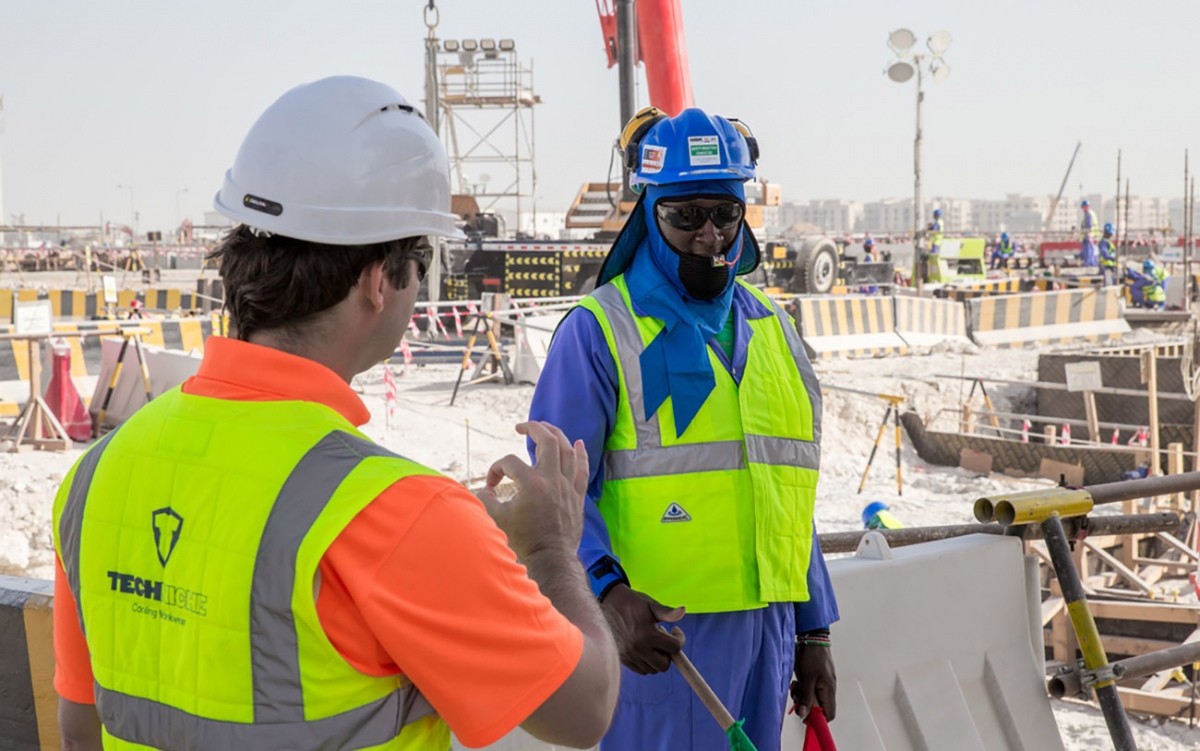.jpg)
_1-itok=GFMKQ6A9.jpg)
Innovative cooling technology has been hailed a success by workers constructing the stadium which will host the 2022 FIFA World Cup™ final.
Evaporative cooling vests, wrist-wraps, cooled towels and neck covers were recently tested by 150 workers at the Lusail Stadium project site. Made from state-of-the-art evaporative and phase change materials, the technology cooled the body temperatures of workers by up to 10°C.
Every worker who took part in the recent pilot described the technology as beneficial, while more than three-quarters said the cooling effect was 'very good'.
Leveraging the influence of the Qatar Innovation Community – a group of key stakeholders accelerating innovation and socioeconomic development in Qatar – the SC identified Techniche as a suitable partner to conduct a pilot offering immediate solutions for workers. The pilot was conducted by US-based Techniche, in collaboration with the SC, and HBK Contracting, Lusail Stadium's main contractor.
Following the success of the pilot, the Supreme Committee for Delivery & Legacy (SC) will now assess the results of the report before exploring ways to utilise the technology which will benefit workers in the short, medium and long-term.
Temperatures on-site reached 40°C during the pilot. Workers tested the technology for a full day, during which they were regularly monitored. Thermal images were taken throughout the test to measure the body temperature of the workers and measure the effectiveness of the technology.
HBK Contracting's Rashid Marera, who currently works as a flag man on the project, gave positive feedback about the technology.
Marera, a 23-year-old from Kenya, said: "The vests are very good. The jacket cools the body – there's not much sweating when we wear these. I think we would like to have these all the time – especially during summer.
Kalyan Viswanathan, HBK Contracting's Workers' Welfare Manager, said the workers welcomed the trial.
"The initial response was positive – the workers like the comfort," said Viswanathan. "It enables them to work better and increases productivity.
Techniche's products are used in various industries, including sport, military, medicine and construction. The company is now hoping to roll out its products on a wider basis in Qatar and support the country's commitment to workers' welfare.
James Russell, Managing Director of Techniche, said: "This was a really important day for us. It gave us a foundation to test our technologies and let us understand how we can fight heat stress in these conditions."
Russell went on to explain how the technology keeps a worker cool.
He continued: "The vests are made from an evaporative fabric called HyperKewl, which is a super-absorbent polymer fibre which you place directly into water to activate. It reduces a worker's body temperature and lasts for around ten hours.
"This technology is at the forefront of the industry. Going forward, there will be research and development into how we take this technology forward, to enable the SC and Qatar to become leaders in heat stress management and workers' welfare."
Mahmoud Qutub, Senior Advisor Special Projects Office and Executive Director of Workers' Welfare, said: "The benefit of this pilot has been very clear to see. The metrics captured by Techniche demonstrated in real time the positive impact on both the mental and physical state of workers.
"Our aim is to find solutions right now using existing technology, however there is an opportunity to develop a product that leaves a legacy for workers not only in Qatar but in any country with a similar climate. That is something we are already exploring."
The Techniche pilot is one of many uses of cooling products by the SC in 2017. Earlier this year the WWD deployed 10,000 cooled towels across all projects in parallel with a separate cooled vest trial on Al Wakrah Stadium.
In addition, the SC also developed an innovative cooled helmet capable of reducing temperatures by up to 10°C. Following an extensive research and development phase, these helmets are expected to be rolled out next summer.
The use of cooled products on SC sites complements a host of initiatives that have been introduced across SC projects designed to enhance the living and working conditions of workers, including a health and nutrition programme with Weill-Cornell Medicine-Qatar, an extensive training and up-skilling programme with Qatar International Safety Centre, a dedicated grievance hotline, and a wide-spread programme of health checks and assessment of emergency medical facilities across all sites.

